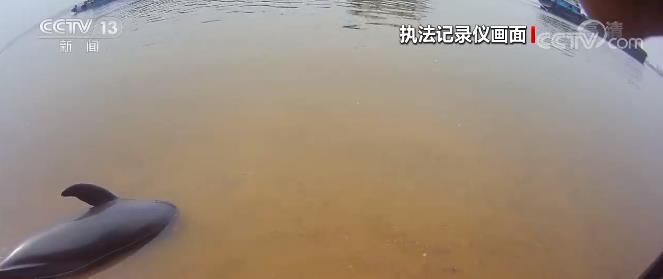CCTV News:Recently, the death of a Yangtze finless porpoise stranded in the Ganjiang section of Nanchang, Jiangxi Province has attracted attention. Experts involved in the anatomy of the finless porpoise said that the initial judgment was that stress reaction led to death.

At about 2 pm on February 22, a citizen found a finless porpoise stranded on the beach at the riverside of the fishing village section of Yangzizhou Town, the northern branch of Ganjiang River in Nanchang, Jiangxi, and immediately called the police for help. Nanchang water police, fishery officials and experts from Jiangxi Fisheries Research Institute rushed to the scene at the first time.
Experts confirmed on the spot that the stranded finless porpoise was an adult Yangtze finless porpoise and had died. The finless porpoise was 144.6 cm long and weighed 43 kg, and no scars were found on its appearance. Subsequently, the dead finless porpoise was brought back to Jiangxi Institute of Fisheries Science for dissection.
Zhang Yanping, Director of Fishery Resources and Environmental Protection Research Office of Jiangxi Institute of Fishery Science:After anatomical observation and pathological analysis, it was found that there was no food in the stomach of finless porpoise, which might lead to stress reaction and sudden death. Other organs are normal, so it is judged that the death is caused by non-human factors.
The Yangtze finless porpoise is the only existing large cetacean in the Yangtze River. Because of its small population, it is also known as the "giant panda in the water". In the List of National Key Protected Wild Animals released in early February this year, the Yangtze finless porpoise was upgraded from a national second-class protected wild animal to a national first-class one.
Since the water levels of Xingzi Station and Duchang Station of Poyang Lake in Jiangxi Province fell below the 9-meter mark on December 8, 2020, Poyang Lake has been running for more than 70 days in the low-water period below 9 meters, which is the longest low-water period in five years. Affected by this, the water level of the Ganjiang River is reduced. According to experts, long-term low water level is easy to cause aquatic organisms to be trapped in beach ponds, which leads to difficulties in foraging.

Zhang Yanping, Director of Fishery Resources and Environmental Protection Research Office of Jiangxi Institute of Fishery Science:Finless porpoises are timid by nature, and may be stimulated by stress after meeting people. After we find the finless porpoise on the shore or river, we should be as careful as possible, including the passing of ships, which may cause stress stimulation, which is very unfavorable to the finless porpoise. Therefore, the public needs to raise their awareness of protection.